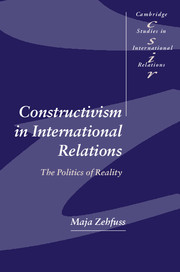Book contents
- Frontmatter
- Contents
- Acknowledgements
- List of abbreviations
- 1 Introduction
- 2 Identity change? Wendt's constructivism and German military involvement abroad
- 3 Intersubjectivity and the normative: Kratochwil's constructivism and German military involvement abroad
- 4 Words and world: Onuf's constructivism and German military involvement abroad
- 5 The politics of ‘reality’: Derrida's subversions, constructivism and German military involvement abroad
- 6 The politics of constructivism
- Bibliography
- Index
- CAMBRIDGE STUDIES IN INTERNATIONAL RELATIONS
6 - The politics of constructivism
Published online by Cambridge University Press: 22 September 2009
- Frontmatter
- Contents
- Acknowledgements
- List of abbreviations
- 1 Introduction
- 2 Identity change? Wendt's constructivism and German military involvement abroad
- 3 Intersubjectivity and the normative: Kratochwil's constructivism and German military involvement abroad
- 4 Words and world: Onuf's constructivism and German military involvement abroad
- 5 The politics of ‘reality’: Derrida's subversions, constructivism and German military involvement abroad
- 6 The politics of constructivism
- Bibliography
- Index
- CAMBRIDGE STUDIES IN INTERNATIONAL RELATIONS
Summary
Constructivism obscures the politics already involved in representing reality. This is at the heart not only of constructivism's success but also of the celebration and despair it triggers. Those wary of constructivism object to the exclusion of challenging and thought-provoking questions about politics and the political. On the other hand, it is precisely a certain unproblematic acceptance of reality which has made the constructivist ‘success story’ possible. ‘Taking reality into account’ is one of the supposed virtues of constructivism. Both the material and the social worlds are construed to have a facticity which constructivist analyses of international relations must, and do, take into account. Wendt's, Kratochwil's and Onuf's approaches take given realities as their starting points, but this also seems to be a key part of the constructivist project more broadly. According to Stefano Guzzini, constructivism acknowledges ‘the existence of a phenomenal world, external to thought’. It does not deny ‘a reality to the material world’, as Emanuel Adler and Michael Barnett put it. Adler also asserts that constructivism opens up ‘the objective facts of world politics, which are facts only by human agreement’, as new areas for empirical investigation.
In the introduction I claimed that a critique of Wendt's, Kratochwil's and Onuf's work would be relevant to ‘constructivism’. Two points can be made without a lengthy exploration as to which ‘constructivist’ studies would fall prey to the criticisms made here.
- Type
- Chapter
- Information
- Constructivism in International RelationsThe Politics of Reality, pp. 250 - 263Publisher: Cambridge University PressPrint publication year: 2002

